Q&A With Dark Horse Manga Editor Carl Horn
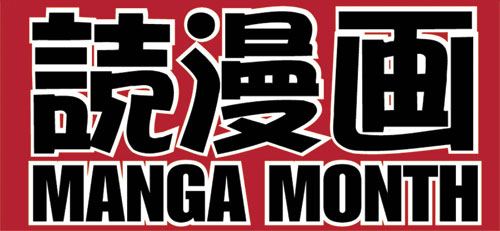
|
Manga has truly become an integral part of the comics world, taking its place alongside comics from the U.S., England and Europe. And while the manga phenomenon is still fairly “young” when compared to American comics, Dark Horse Comics has been publishing manga, successfully, for well over 20 years. From such Japanese classics as Lone Wolf and Cub and Blade of the Immortal to the futuristic thrills of Gantz and Neon Genesis Evangelion, Dark Horse has remained dedicated to manga through an individual approach to properties for audiences of all tastes. In honor of Manga Month, Dark Horse Manga Editor Carl Horn once again took time to speak with us about Dark Horse Manga and upcoming projects to watch for.
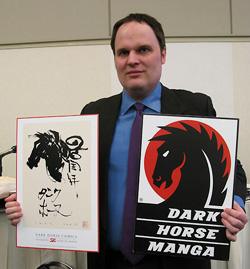 PREVIEWS: The conventional wisdom is that manga does far better in bookstores than in the specialty market. Has this been your experience?
PREVIEWS: The conventional wisdom is that manga does far better in bookstores than in the specialty market. Has this been your experience?
Carl Horn: Yes, in the sense that only a small percentage of the manga today that gets sold in North America, does so through the specialty market, as opposed to bookstores. But it used to be the other way around, and the specialty market has been very important to the history of manga here — between 1987 and 2002, people basically got their English-language manga in the comic stores. That was true not only of Dark Horse titles, but Viz and Tokyopop titles too; Viz's company name was once "Viz Comics," and Tokyopop used to publish shojo manga as "Chix Comix." Comics stores weren't just stocking guys' stuff. Even famous shojo titles like Cardcaptor Sakura, Clover and Magic Knight Rayearth were all first published here in Western comic book format. Oh My Goddess!, which is not shojo but has many crossover fans, spent its first eleven years as a comic book in the specialty market.
P: What do you think specialty market retailers can do to get manga fans into their stores?
CH: Manga are no longer published in comic book form, but history shows comic book shops can be an important place for manga. In some shops, they still are. From my personal experience with stores like Berkeley's “Comic Relief” or Oakland's “Dr. Comics & Mr. Games”, I can see many of the same qualities that make for an excellent comics store make for an excellent manga store. Those two shops think of themselves as stores for the whole neighborhood as well as their hardcore customers, and are friendly and helpful to new, walk-in people of all ages. That attitude pays off. Knowledge is important, too. Your comic fans expect you to know about what's going on in comics: events, story arcs, interesting new titles and creators. If you want more manga fans in your store, you need the same kind of information about what they like. So, needless to say, you have to be seriously interested in manga, or have someone on your staff who is.
P: What criteria does Dark Horse use in choosing which titles to publish?
CH: Different people at Dark Horse make suggestions, based on their personal tastes and interests. In some cases these may be manga that came out in Japan years ago, but we also receive shipments of the latest manga magazines and graphic novels from Japan, so we keep up with current titles as well. We also take into account fan suggestions. From that point on, there are various practical issues we have to think about, such as, do we think there is a large enough market for this manga? How many volumes is it — would it be too big a gamble to try and release it all? Any manga takes work to publish; do we have the resources for every title we might want? How soon would it fit in our publishing schedule, which may already be full up for the next year? Once we've worked out those issues, the next test of course is getting the rights from the Japanese publisher or creator. But of course, there's never a guarantee they will say "yes." If it's a popular manga, we may be in competition with other North American publishers for it. Sometimes we win, and sometimes we lose.
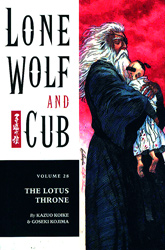
|
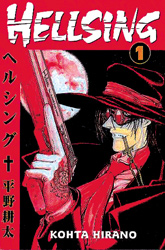
|

|
P: Which titles have been the big hits for Dark Horse?
CH: Over the years, Lone Wolf & Cub, Hellsing, Blade of the Immortal, and Oh My Goddess! have sold very well. More recently, our Neon Genesis Evangelion and CLAMP books have been pretty successful. Although it's a Japanese novel series and not a manga, Vampire Hunter D has been a notable hit.
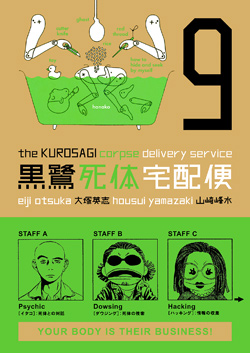 P: Are there any that you think maybe haven’t caught on as much as they deserved?
P: Are there any that you think maybe haven’t caught on as much as they deserved?
CH: Although they're titles for older readers, I would say that Eden and The Kurosagi Corpse Delivery Service fit in this category. They're both superior works in their genre: Eden is a post-apocalyptic science fiction adventure and Kurosagi is a horror story that touches on issues in modern-day Japan. Other excellent titles with disappointing sales have been Ohikkoshi, a one-shot romantic comedy from Blade of the Immortal's Hiroaki Samura, and Satsuma Gishiden, a samurai manga from one of the great masters of the genre, Hiroshi Hirata.
P: What can you tell us about upcoming projects?
CH: We have several new titles we haven't announced yet; some are new omnibus projects, and some have never before been published in English. Sorry to be so vague, but actually, figuring out the exactly the best time to announce something takes almost as much work as getting the rights to it in the first place! Almost. ^_^
P: There seem to be constant arguments about what is or isn’t manga (whether the comics are made in Japan, what the genre is, etc.). How would you define manga, especially to someone who may not be familiar with it?
CH: I think manga are comics that were first created for Japanese readers, and that's what makes them a different experience from comics that were first created for North American readers. North American comics fans have been inspired by manga (and anime) for a long time; that goes back at least to Ronin in the early '80s. But the system, the culture, and the audience you make the work for defines how the final product turns out. If you pitched the same concept to a Japanese manga editor and an American comics editor, you'd come out with two different works.
To explain it another way, we don't say that Japanese movies and American movies are the same, just because they're both made using the same kind of equipment. When Quentin Tarantino made Kill Bill, he took a lot of inspiration from Japanese movies and even used Japanese actors. But he didn't say that made it a Japanese movie; it was a Hollywood movie with a Japanese influence. There's nothing wrong with saying Japanese comics and movies are different from North American ones, because, if they didn't offer us something different, we wouldn't be interested in them in the first place.
It's the same kind of difference that makes some manga creators interested in American comics; Yu-Gi-Oh's Kazuki Takahashi is a fan of Hellboy's Mike Mignola, and Battle Angel Alita creator Yukito Kishiro is a fan of Xerxes' Frank Miller.


